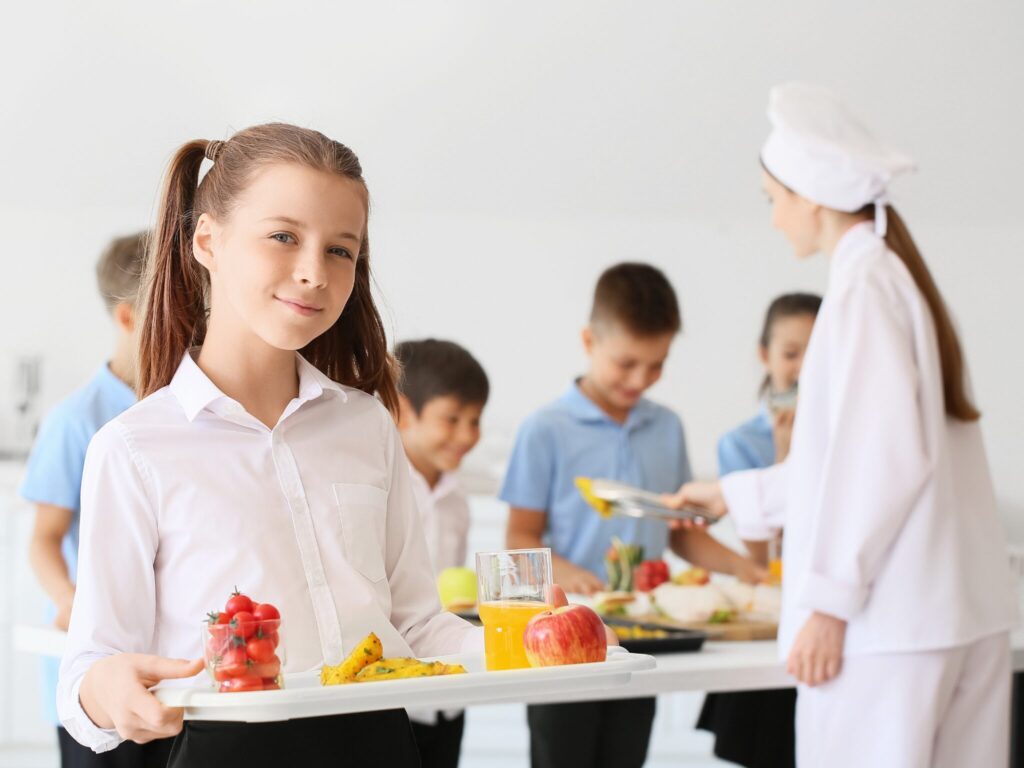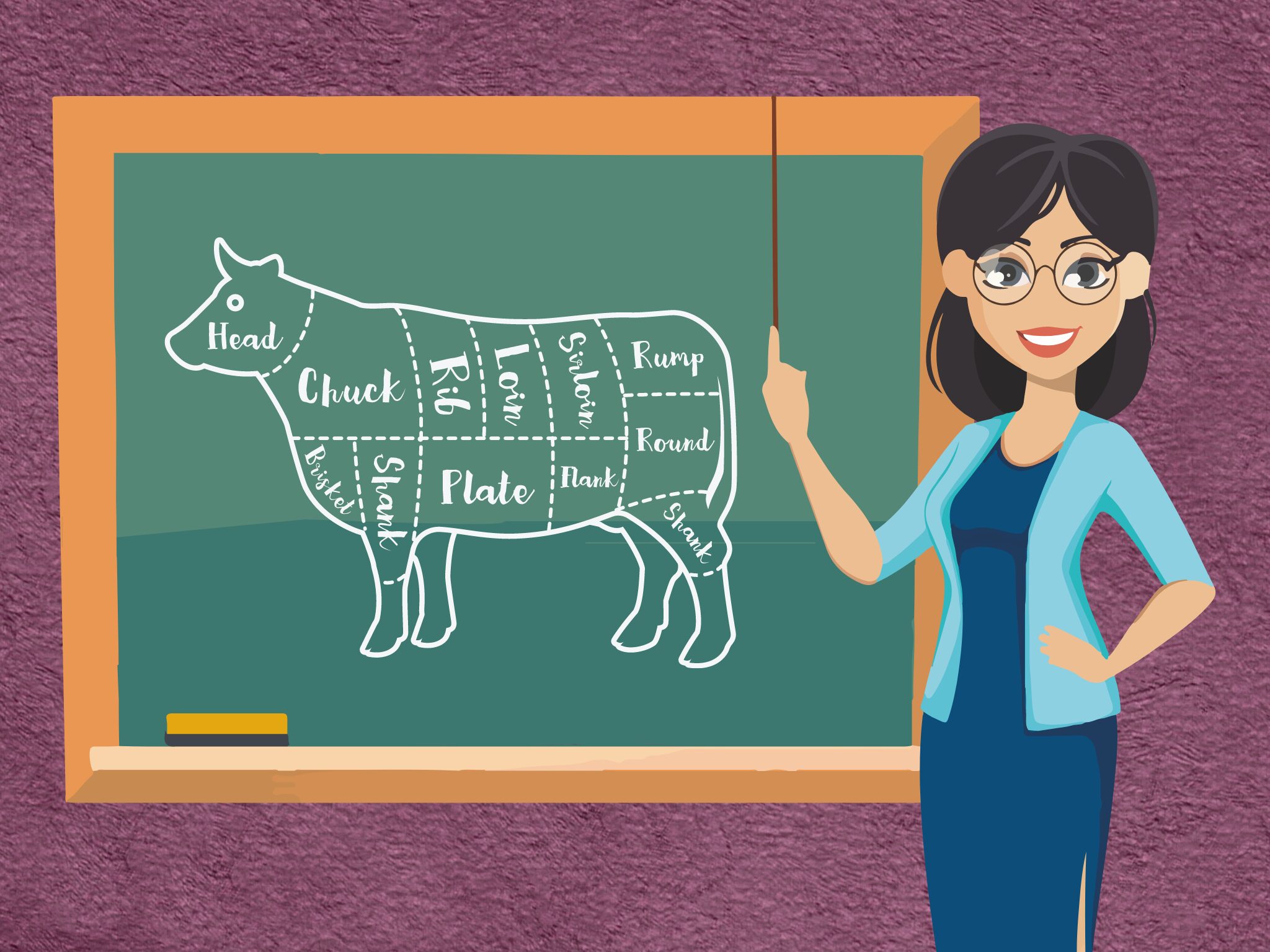Meat Misinformation: How Big Beef is Funding Education Schemes to Influence Kids
6 Mins Read
Today’s kids are more vulnerable to climate change than any generation, and thus more inclined to have consumption behaviours that are kinder to the planet – the meat industry is trying to derail that by influencing the education system.
Writing for the Press Herald in 2022, food writer Avery Yale Kamila had a forecast to make: “Knowing quite a few members of Gen Alpha, I predict these young people will look at Gen Z’s love of vegan meals and say: “Hold my soy milk,” before showing us how veg-forward a generation can get.”
It underlined the importance of sustainability and planet-friendly habits among the world’s youngest generation. In 2019, one report found that 67% of six- to nine-year-olds wanted their central career path to be directed towards saving the planet. And that makes sense too: set to be the largest age demographic group ever, Generation Alpha will experience more adverse climate change impacts than the rest of us.
A 2021 analysis showed that people born in 2020 onwards could face up to seven times more extreme weather events – especially heatwaves – than those born in 1960. To Kamila’s point then, this is already beginning to shape how this cohort lives. According to one survey (also from 2021), 72% of millennials with children said their families are eating plant-based meats more often. And kids’ behaviour is extending to adults too – 80% of parents have been influenced by their Gen Alpha children to change their consumption behaviours or actions to be more eco-conscious.
Meat is notoriously bad for the climate – it accounts for 60% of the entire food system’s emissions, while the wider livestock industry takes up 77% of all agricultural land, despite producing only 18% of the world’s calories and 37% of its protein. Beef, meanwhile, is the worst of the lot in terms of supply chain emissions, with a footprint more than double that of the next on the list.
So naturally, Big Beef has a PR problem, especially amongst Gen Alpha. But it is an impressionable group, and it’s why the industry is hoping to change kids’ opinions on the industry.
How the beef industry is influencing teachers

As reported by Wired, the American Farm Bureau Foundation for Agriculture (AFBFA) – a beef industry group – has been producing lesson plans, resources, in-person events, and webinars for the last eight years as part of a campaign to influence teachers across the US to bolster beef’s rep.
This is because the AFBFA is apprehensive about science teachers – and subsequently, millions of students – getting exposed to “misinformation”, “propaganda” and “one-sided or inaccurate” information, when they “turn toward the internet for information when designing lessons”.
The group wants to increase “agricultural awareness and literacy in teachers and students”, which it says will lead to a higher level of “consumer trust and interest in the beef industry”. On similar lines, a funding document reveals that it hopes to leave educators with a “more positive perception” of the cattle sector.
To illustrate the programme’s “ability to build beef demand protect beef’s image”, the AFBFA refers to a 2021 survey of science teachers, which found that 82% have a positive perception of how cattle are raised for beef production, and 85% believe the industry is very important to society. Those who attended one of the group’s programmes are eight percentage points more likely to trust positive statements about beef production.
This extends to children too, with 92% of educators saying AFBFA programmes have “furthered their students’ understanding of the importance of the beef industry to society”. The group’s executive director, Daniel Meloy, hopes that this programme will help students “gain a greater understanding of agriculture through science education”, according to Wired.
This is evidenced in the lesson plans provided by the AFBFA. One of these directs students to beef industry resources like BeefNutrition.org and FactsAboutBeef.com – both of these are funded by the Beef Checkoff scheme, a national marketing programme designed to increase demand for beef both domestically and internationally. The AFBFA is also a contractor to Beef Checkoff, which has spent $42M this year alone across its initiatives – these amounts are approved by beef industry groups the Cattlemen’s Beef Board and the Federation of State Beef Councils.
Another lesson plan directs students to create a presentation for a conservation agency introducing cattle into their ecological preserve. Meanwhile, younger students practice sums by adding the acreage of cow pastures in one worksheet, while another one aimed at kids aged 8-11 asks teachers to “remind students that lean beef is a nutritious source of protein that can be incorporated in daily meals”.
The AFBFA campaign further includes teachers’ visits to ranches or other parts of the supply chain – last year, 29 educators and school administrators attended a three-day event by the Colorado Beef Council in Denver (which included three webinars as well). It followed similar events taking place in Minneapolis, Nashville, Oklahoma City, and Syracuse, New York since 2019. Meloy said the programme is aimed at high- and middle-school teachers, with each of the AFBFA’s On the Farm immersive events hosting up to 30 of them. And participants at the most recent event represented over 70,000 students.
One of the AFBFA’s funding documents reveals that educators’ perceptions of beef changed positively after attending an On the Farm experience. “They shared that their existing perception of beef production was that of unsustainable agricultural practices carried out using an uncaring corporate-style management structure,” it reads, adding that the programme allowed them to observe how passionate farmers are about the health and quality of their animals, and how much science and tech goes into farming.
A blatant attempt at misinformation

The funding document mentions the implementation of the Next Generation Science Standards (NGSS) in 44 US states, which sets guidelines to encourage teachers to emphasise how science is used in a real-world context. The AFBFA hopes to use this shift as a way to provide teachers with learning materials about the beef sector.
“NGSS requires teachers to approach challenging topics such as climate change and sustainability. Teachers and students are receiving information from educationally trusted sources that do not represent agriculture accurately or in a balanced way, and beef production is often the target of the misinformation,” it says. “To achieve balance and to ensure the accuracy of information, a concerted effort must be made to engage teachers in the conversation around these topics.”
The document further revealed that the AFBFA, whose 2024 campaign is set to cost $800,000, plans to strengthen its relationship with State Beef Councils to reach as many people as possible – 2.5 million educators and a further 125,000 key opinion leaders this year. “This programme’s resources do not promote or encourage students to make a predetermined decision,” Meloy told Wired. “Scientific accuracy is our focus and is demanded by the K-12 Framework for Science Education and built into the NGSS.”
But “scientific accuracy” seems like a bit of a stretch, when you consider that AFBFA’s classroom resources feature images of cattle in open fields, sidestepping the reality of concentrated animal feeding operations (CAFOs), where 70% of American cows (66 million) are held for at least 45 days. These are confined spaces that house animals in suffocating conditions without the freedom (or really, the space) to roam.
The meat and dairy industry – with its billions of dollars in government subsidies – will continue to run the education sector ragged in its hope of influencing the leaders of tomorrow. And that’s despite the attempts being blatantly subjective, biased and misinformed. But it’s critical that these efforts are curtailed – you don’t want Gen Alpha Americans to grow up and think eating meat isn’t harmful to the climate, like the current adults do.
The AFBFA says its campaign “will lead to a deeper understanding and appreciation of the beef industry as current and future consumers become better equipped to sort fact from fiction” – but maybe the foundation needs to go on its own fact-finding mission.




